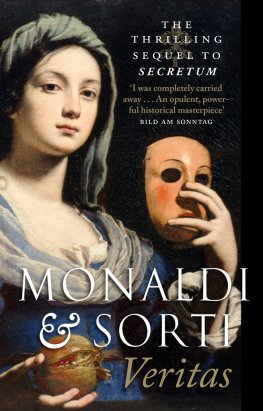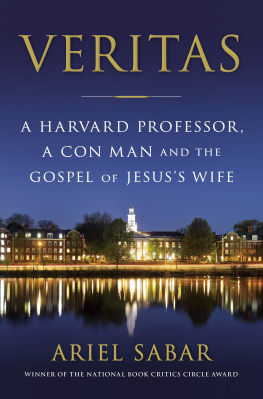Rita Monaldi - Veritas
Here you can read online Rita Monaldi - Veritas full text of the book (entire story) in english for free. Download pdf and epub, get meaning, cover and reviews about this ebook. genre: Detective and thriller. Description of the work, (preface) as well as reviews are available. Best literature library LitArk.com created for fans of good reading and offers a wide selection of genres:
Romance novel
Science fiction
Adventure
Detective
Science
History
Home and family
Prose
Art
Politics
Computer
Non-fiction
Religion
Business
Children
Humor
Choose a favorite category and find really read worthwhile books. Enjoy immersion in the world of imagination, feel the emotions of the characters or learn something new for yourself, make an fascinating discovery.
- Book:Veritas
- Author:
- Genre:
- Rating:5 / 5
- Favourites:Add to favourites
- Your mark:
- 100
- 1
- 2
- 3
- 4
- 5
Veritas: summary, description and annotation
We offer to read an annotation, description, summary or preface (depends on what the author of the book "Veritas" wrote himself). If you haven't found the necessary information about the book — write in the comments, we will try to find it.
Rita Monaldi: author's other books
Who wrote Veritas? Find out the surname, the name of the author of the book and a list of all author's works by series.
Veritas — read online for free the complete book (whole text) full work
Below is the text of the book, divided by pages. System saving the place of the last page read, allows you to conveniently read the book "Veritas" online for free, without having to search again every time where you left off. Put a bookmark, and you can go to the page where you finished reading at any time.
Font size:
Interval:
Bookmark:
Rita Monaldi,Francesco Sorti
Veritas
The horrendous battle is no longer between Trojans and Achaeans, but now the Danaans are fighting even with the immortals.
Jove the Father created a third lineage of talking men, a brazen one, in no way similar to the silver one: sprung from ash-trees, violent and terrible.
They were keen on the works of Mars, bearers of grief,
and all sorts of violence; they ate no wheaten food,
but were hard of heart like adamant, fearful men.
(HOMER, Iliad, and HESIOD, Works and Days, in: B.A. BORGESE, Rub)An Appointment
The great room is all a-glitter, with the bronze of its furnishings and spiral decorations, and its glowing candles.
Abbot Melani keeps me waiting. Its the first time, in over thirty years.
Until today, whenever I arrived at our appointments I had always found him already waiting, tapping his foot impatiently. But now it is my turn to gaze continually towards the severe monumental doorway by which I entered over half an hour ago. Defying the freezing, snow-laden wind that sweeps in and sets the doors creaking on their hinges, I vainly strain my ears and eyes for the first signs of the Abbots arrival: the drumming hooves of the four-horse carriage; the first glimpse, in the torchlight, of the horses plumed heads as they draw the ceremonial black carriage to the foot of the entrance staircase, where four old footmen, huddled in their snow-dusted greatcoats, are waiting for their even older master, ready to open the carriage door and help him, one last time, to descend.
As I wait, I let my eyes wander. The room is richly ornamented. From the arches hang great drapes with words embroidered in gold; the walls are swathed in brocaded mantles, and veils adorned with beads of silver form a gallery of honour. Columns, arches and pilasters of sham marble lead towards the central baldachin, which is a sort of truncated pyramid resting on a platform six or seven steps above floor level and surrounded by a triple row of candelabras.
At the top, two winged silver creatures, kneeling on one leg, their arms outstretched and the palms of their hands raised heavenwards, perch in expectation.
Twisting branches of myrtle and ivy adorn the four sides of the baldachin, each of which proudly bears the coat of arms picked out in fresh flowers, apparently plucked straight from the hothouses of Versailles of the Veneto nobility: a piglet on a green field. At each corner stands a flaring torch on a tall silver tripod, adorned with the same coat of arms.
Despite the grandeur of the Castrum and the splendid accoutrements, there are very few people around me; apart from the musicians (who have already taken their places and uncased their instruments) and the valets in their black, red and golden livery (who, with their freshly shaven faces, stand motionless as statues holding ceremonial torches), I can only see down-at-heel noblemen looking on enviously and a crowd of workmen, servants and gossiping women, who, despite the late hour and the icy cold of the winter night, gaze around themselves in ecstasy, waiting for the procession.
Taking its impulse from my eyes, my memory starts to wander as well. It abandons the snow and the leaden Parisian winter of the deserted Place des Victoires which lies over the threshold, where biting northern wind swirls around the equestrian statue of the old King, and it swoops back, far back, to the gentle slopes of the Eternal City on its seven hills, to the top of the Janiculum Hill, and the dazzling heat of a Roman summer many years ago. It was on that occasion, surrounded by different nobility, amid more ethereal architecture of papier-mch, with a different orchestra trying out music for a different event and valets holding torches that would illuminate another story, that I caught sight of a carriage trundling along the driveway of Villa Spada.
How strange are the workings of destiny: at that time I had no idea that it was about to reunite me with Abbot Melani after seventeen years of silence; this time I know for sure that Atto is going to arrive, but the carriage that is bearing him towards me refuses to appear on the horizon.
My train of thought is briefly broken by one of the players, who bumps into me accidentally as he climbs down from the platform. I raise my eyes:
Obsequio erga Regem
is embroidered in gold characters on the black, silver-fringed velvet drape that adorns the tall column of false porphyry in plain style opposite me. Another column, identical to this one, stands on the other side, but the writing is too far away for me to read.
In my whole life, I have only attended one such event. Then too it was a cold night and it was snowing, or raining, I think. There was certainly cold and rain and darkness within my heart.
On that occasion too I was in Attos company. We were part of a great bustling crowd: people were streaming into the room from all sides. Every corner was so packed that Abbot Melani and I could only elbow forward two paces every quarter of an hour; it was impossible either to advance or to retreat and we could see nothing but the ceiling decorations and the inscriptions hanging from the arches or placed at the tops of the capitals.
Ob Hispaniam assertam
Ob Galliam triumphatam
Ob Italiam liberatam
Ob Belgium restitutum
There were four columns bearing mottoes. They were of the Doric order, the symbol of heroes, and very tall: about fifty feet, in imitation of the historic columns of Rome, the Antonine and the Trajan. Between them, on the Castrum, an imitation night sky made of veils was adorned with golden flames and gathered upwards in the centre, in the shape of a crown, by gold cords and sashes tied by four gigantic buckles in the form of majestic eagles, with their heads resting on their chests.
Alongside them, Glory, with rays radiating from her head (in imitation of Claritas on the coins of Emperor Constance), held a laurel crown in her left hand and a crown of stars in her right.
Behind us, just beyond the great doorway, twenty-four valets were awaiting their lord. Suddenly the hubbub died down. Everyone fell silent and a glimmering light assailed the darkness: it came from the flaring white torches borne by the scions of the nobility.
He had arrived.
The sound of drumming hooves coming to a halt on the pavement outside jolts me from my memories. The four footmen, palely gleaming with snow in the winter night, are finally moving. Atto is here.
The candle flames flicker and blur before my eyes, while the doors of the church where I am awaiting him are thrown open, the church of Notre Dame des Victoires, the basilica of the Barefoot Augustinians. From the black carriage emerges the red velvet of the bier, glistening in the torchlight: Atto Melani, Abbot of Beaubec, Kings Gentleman, Cittadino Originario of the Most Serene Republic, many-time Conclavist, is preparing to make his solemn entrance.
The old servants bear the coffin on their shoulders; it is engraved with the piglet on a green field, Attos coat of arms. From beneath the gallery of honour formed by the black veils with silver beads, some mourners make their way through the two wings of bystanders: they are the few people to whom the formerly illustrious name of Atto Melani, the last witness of an age now swept away by war, still perhaps means something. The four footmen proceed right to the heart of the Castrum doloris, the funereal catafalque, and, having mounted the steps of the truncated pyramid, they consign the corpse of their old master to the open arms of the two silver genuflecting angels, the palms of whose upturned hands finally receive what they have been waiting for.
On the catafalque hangs a funeral drape of black velvet with silver fringes, on which is embroidered in golden characters:
Font size:
Interval:
Bookmark:
Similar books «Veritas»
Look at similar books to Veritas. We have selected literature similar in name and meaning in the hope of providing readers with more options to find new, interesting, not yet read works.
Discussion, reviews of the book Veritas and just readers' own opinions. Leave your comments, write what you think about the work, its meaning or the main characters. Specify what exactly you liked and what you didn't like, and why you think so.












